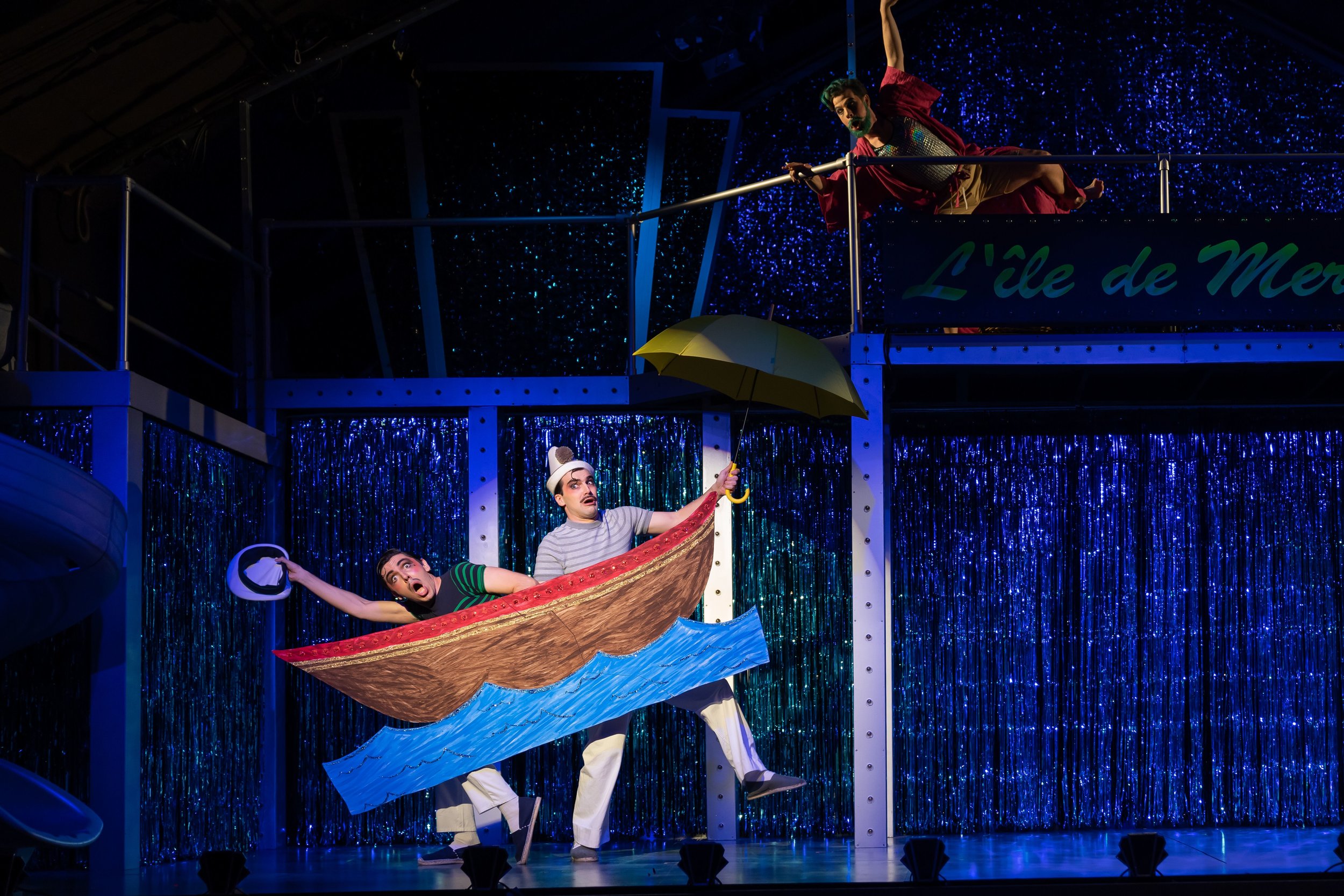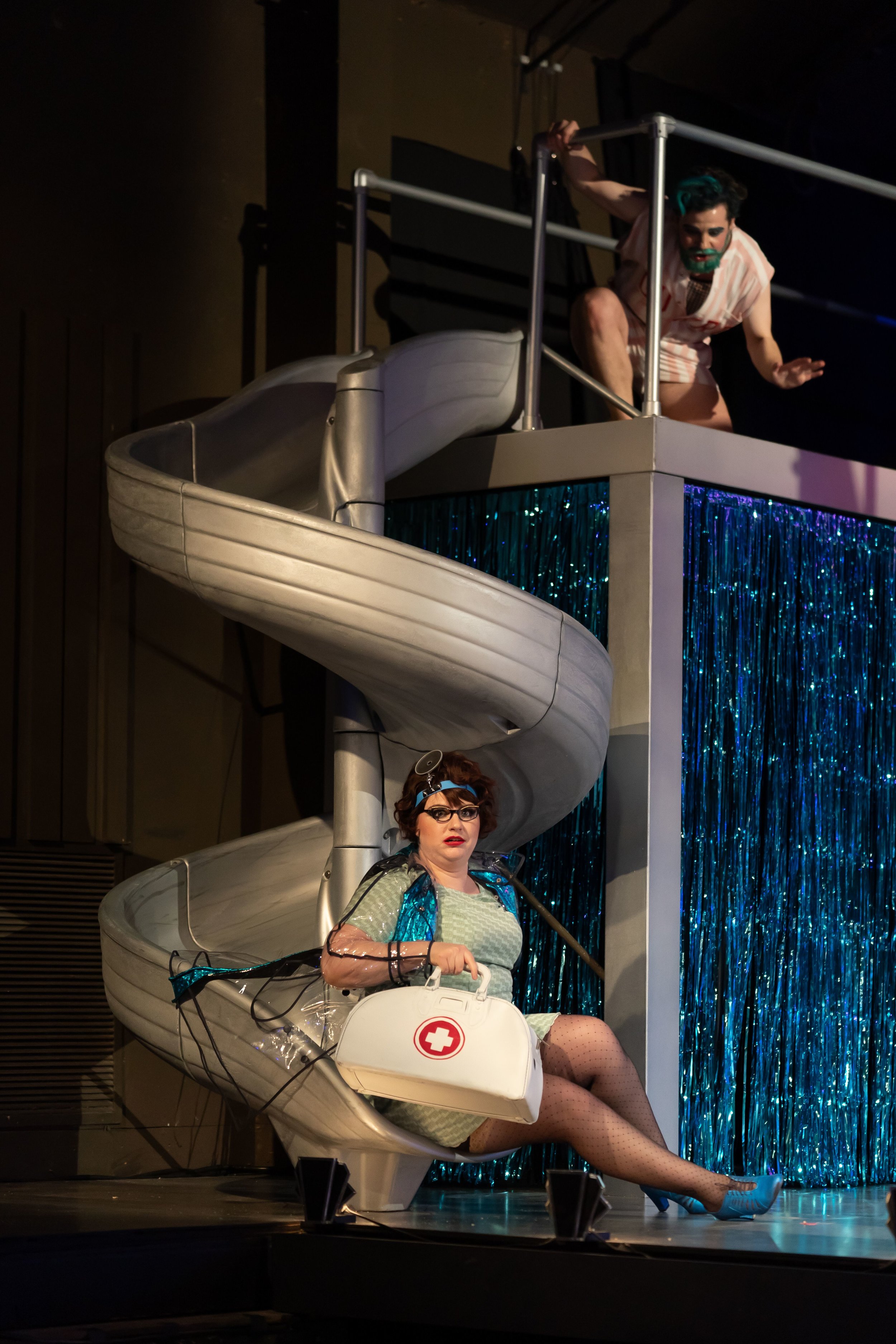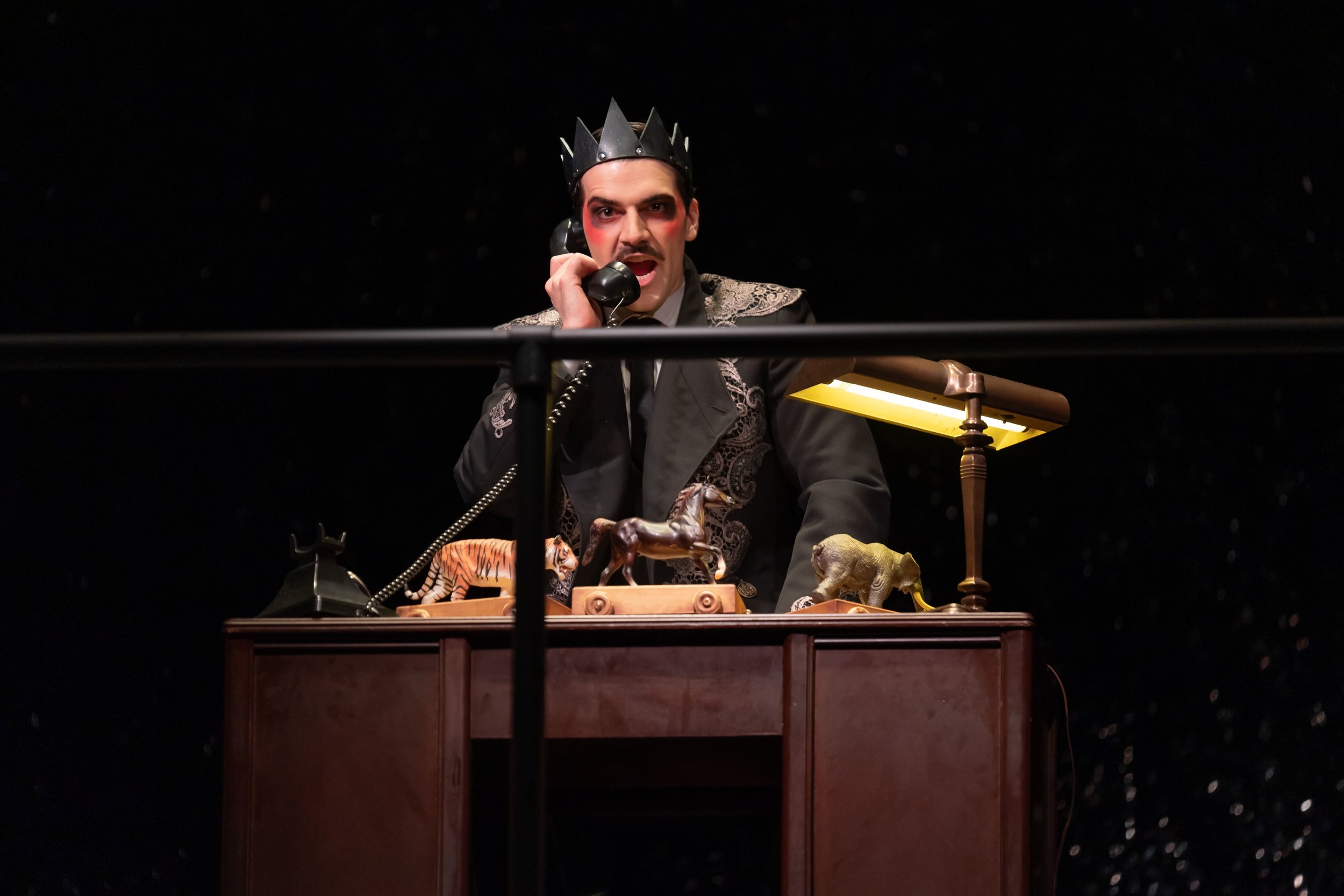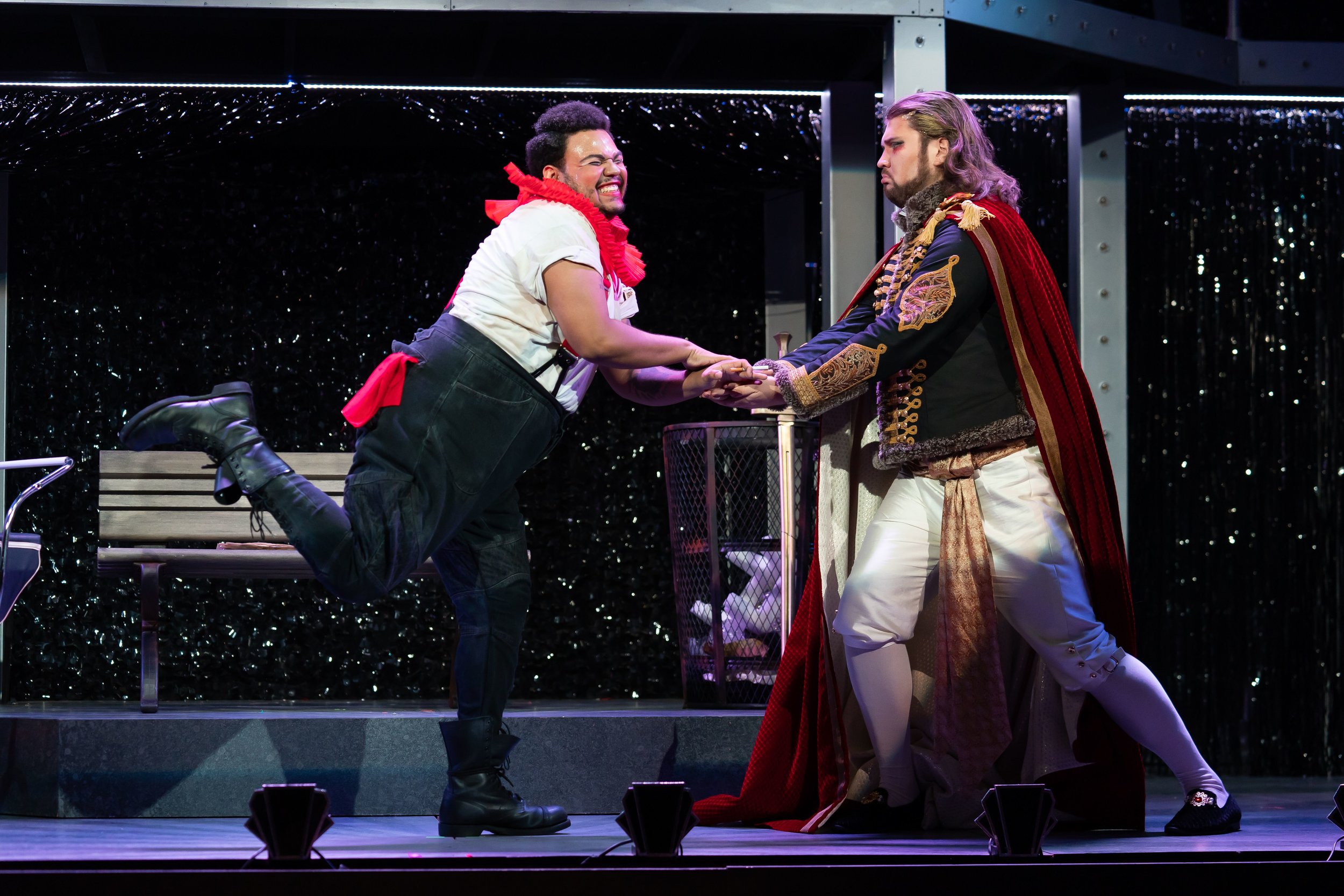Wolf Trap Opera’s opening salvo of opera at The Barns this summer is a twin bill combining Gluck’s Merlin’s Island and Ullman’s The Emperor of Atlantis. I enjoyed Merlin’s Island. It’s a fine farce providing social commentary that is still valid today. As done by WTO’s young artists, it is a piece of puff pastry to be relished. However, The Emperor of Atlantis is the one not to miss; I thought it brilliant. Sometimes, something special happens. Stage directors are always trying to achieve that thing, but it’s illusive. First, they have to have a good play or opera to work with; then they have to be talented, and then, they have to be lucky; somehow it all works. It’s like the heavens, maybe as a tease, occasionally allow us a glimpse of the truth of our lives through such works.
l to r: Two sailors from Paris, Scapin (Daniel Noyola) and Pierrot (Ben Edquist) approach Atlantis as Merlin (Conor McDonald) tracks them overhead. Photo by Scott Suchman; courtesy of Wolf Trap Opera.
Merlin’s Island (1758) is essentially Gluck does French vaudeville, a surprise to me; the libretto, written by Louis Anseasume, is in French. But speaking of surprises, in my preview blog report, I labelled WTO’s new season as “Here Comes the Judge” and as if by fate, early on in this opera the Judge appears. Maybe I should say that Gluck does “Laugh In”. Though he wrote quite a few operas, Composer Christoph Willibald Ritter von Gluck is today popularly known for his opera, Orfeo ed Euridice, and for having a major impact on the opera genre by flipping the script, giving the drama precedence over the music, rather serious stuff. Merlin’s Island is an opéra comique, a genre that evolved from French vaudeville productions of the time and consisted primarily of arias and spoken dialog; if a comedy, the humor derived from its social commentary. In this Gluck commentary on French Society, two sailors are shipwrecked on an island where there is no crime; philosophers recommend laughter; being rich is frowned upon, and husbands and wives are always faithful. The sailors’ world has been turned upside down. WTO’s production is modified, somewhat shorter I think, and a few touches added to make it more Parisian, such as adding an accordion to the ensemble and performing the opera in a cabaret style. The result is disarmingly funny from the very beginning until the end. The music is pleasant and for the most part sounds very traditional of the mid eighteenth century, though varied in style for the different scenes. The focus of this opera is the scenes not the continuum. The Filene Artists and their younger siblings in the Studio Artist program showed remarkable acting ability in a comedy staged to veer sharply from classical opera. Believe me, you will laugh. All of the artists acquitted themselves well in their vocals. Highlights for me included the remarkably strong, clear voice of bass Daniel Noyola who played sailor Scapin and baritone Conor McDonald’s campy and engaging Merlin. I thought that soprano Shannon Jennings and mezzo-soprano Niru Liu who played Merlin’s nieces, Argentine and Diamantine, sounded especially good together in a duet where they were singing on opposite sides of the stage, and finally, mezzo-soprano Megan Ester Grey demonstrated remarkable calm while projecting power as the island’s doctor; her voice caused me to take notice, and she showed some good moves coming down the slide. For me, the storyline fizzles a bit with Merlin needing to deliver a deux ex machina ending, but perhaps there is meaning there that Merlin had to convert the sailors to the ways of Atlantis. Clearly Merlin’s Island is as relevant for today’s society as its original audience. Gluck’s opera is not just an historical curiosity; otherwise, it wouldn’t be funny.
l to r: Merlin’s nieces, the rich, young bachelorettes, Argentine (Shannon Jennings) and Diamantine (Niru Liu) arrive to court the sailors. Photo by Scott Suchman; courtesy of Wolf Trap Opera.
I came expecting two comedies, one light and one dark. However, while The Emperor of Atlantis (or Der Kaiser von Atlantis in German) has some laughter-generating scenes, they were over shadowed by the darkness. And the back story to the opera casts its own shadow. But as the libretto notes, it is human to laugh, even as we hold back tears, and we need to keep laughing. The opera was written in 1943 when composer Viktor Ullmann and librettist and poet Peter Kien were held in Theresienstadt, a “model ghetto” that the Germans used to show the world how well the inhabitants were treated as a means to deflect attention from the gas chambers. While opportunity there existed for creating works of art, the German authorities would not allow this work to be performed, correctly viewing it as anti-Hitler. The underlying story line is that Death, wearied of human folly, finally gets fed up by Emperor Overall’s call for total war, everyone against everyone, and Death goes on strike. The Emperor at first claims not dying is a gift to his supporters but soon the absence of death undermines his authority, and Death requires as a condition of returning to work that the Emperor be his first customer. Both Ullmann and Kien were transferred to Auschwitz and died in the gas chambers there. For them, their message of tolerance for all humanity ended horrifically. The opera finally premiered in 1975 in the Salzburg Festival. Somehow, I feel honored to have witnessed it.
l to r: Hippocratine (Megan Ester Grey) arrives while Merlin (Conor McDonald) observes overhead. Photo by Scott Suchman; courtesy of Wolf Trap Opera.
At first the mix of characters seemed weird - Loudspeaker, Harlekin, Death, Drummer, Emperor Overall, Soldier, and Girl with the Bobbed Hair, and there were times in some of the scenes when I did not know what was going on. The character Harlekin danced and sang and laughed and asked Death to kill him; Death refused. A drummer spreads the news of Emperor Overall’s decrees. Loudspeaker would not lie but would not reveal the truth. A man and woman try to kill each other and fall in love. I don’t know that I will ever get the image out of my mind of Emperor Overall prancing around in his office while admiring himself in a handheld mirror. What made me love this opera was the slow realization that something was stirring inside me, that somehow the opera was communicating with me in spite of the apparent lack of coherence. That is why I call it brilliant. I also think Kien’s poetry is brilliant, making me want to read the libretto. By the end, my laughter had been replaced by tears. As I have thought more about this opera, it is likely brilliant for another reason. Ullman and Kien could not have told their story straight up; it needed the cover of a zany fantasy to survive in their world at the time. In the end, I found the opera unsettling. Given the divisiveness in our country and the world today, might it happen again? Kudos to Director Richard Gammon, and as he alludes in his program notes, this encounter with Death causes one to embrace life even more strongly, and I will add for Viktor and Peter - for everyone.
Emperor Overall (Ben Edquist) isolated and ruling from his office. Photo by Scott Suchman; courtesy of Wolf Trap Opera.
I was so absorbed in the drama that I am hard pressed to speak to the music. Gluck would have been proud. Ullman’s music is varied in style and was scored for the limited number of instruments likely available in Thieresienstadt. It certainly supported the story and contributed to moods and was enjoyably melodic. Ullman was a student of Schoenberg, but the score was not disconcertingly dissonant, though it reflected the tension in the drama. In fact, kudos are due Conductor Geoffrey McDonald and the WTO orchestra for both performances. Again, the young artists acquitted themselves well, in some cases smashingly so, with some holdovers from Merlin’s Island who had to sing in both French and German that night. Anthony Robin Schneider gave a tour-de-force performance as the moody and depressed Death; with his stature and rich baritone voice he dominated the stage. Baritone Ben Edquist gave an excellent performance in Merlin’s Island, but an even better one as Emperor Overall; I am sorry to report, Mr. Edquist, that you were an amazingly effective loathsome dictator. Tenor Joshua Blue was both funny and touchingly sad at the same time as Harlekin, and Daniel Noyola returned to make an outstanding, if duplicitous, Loudspeaker.
l to r: Harlekin (Joshua Blue) engages Death (Anthony Robin Schneider) in a macabre dance; Soldier (Victor Cardamone) embraces Girl with the Bobbed Hair (Shannon Jennings) after they try to kill each other. Photos by Scott Suchman; courtesy of Wolf Trap Opera.
I liked the pairing of these two operas. Two light pairings might test our endurance and two dark pairings might send us in for therapy. Kudos to Wolf Trap Opera for again giving us the opportunity to hear such talented performers and for bringing us less well-known operas so high in both entertainment and artistic value.
And don’t miss The Emperor of Atlantis.
The Fan Experience: “The World Turned Upside Down” has additional performances on June 28 and 30. The Barns continues to be one of my favorite venues for attending opera, and it’s coziness works especially well for the intimate cabaret styling of this double bill.
Pianist Joseph Li, who accompanied Steven Blier in his 25th anniversary concert, gave one of the best pre-opera talks that I have heard, providing substantive background and insights into these operas. The pre-opera talk begins one hour before the performance.






